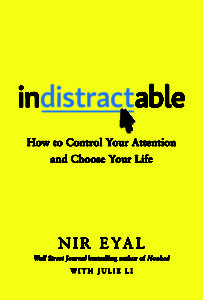Excuses are everywhere. It’s the television when you’re eating with your family; the internet when you’re trying to work; or push notifications on your phone just about whenever. They are not only annoying or dare we say, distracting, but they are also potentially deadly. Yet despite all our modern attention-grabbing technology, getting distracted is not a new problem nor is it worse now than ever before. We’ve always been distracted and, crucially, willing to have our attention swayed. Bestselling author of Indistractable: How to Control Your Attention and Choose Your Life Nir Eyal recently spoke with WellWell about the root causes of human distraction, it’s dangerous effects and how to stop getting distracted.
What was your motivation in writing Indistractable?
It was the question we’ve been trying to answer for the past 25,000 years, why do we do things we know we shouldn’t do and why don’t we do the things we know we should? A lot of books out there and self-help gurus will tell you what to do but if we’re honest with ourselves we pretty much already know what to do, right? If you want to be healthy, exercise and eat right. If you want to have good relationships, be fully present with people. If you want to great at your job, do the damn work. Right? Then why don’t we do those things? That’s the question I wanted to answer.
Is technology a major cause of distraction?
I think technology is a proximate cause but not the root cause. It’s a surface level analysis and people who aren’t willing to think a little deeper have always reached for something to blame to not have to blame themselves. Every generations had some version of this argument. My generation was the television, today’s is video games and cell phones, before that it was the radio, I mean literally even the written word. Socrates derided it as something that will enfeeble men’s mind. So every new technology of this magnitude scares people crazy. It scares them senseless. We always overreact. We always have a moral panic thinking that the technology of the day is making us stupid and melting our brain, and it’s never really the cause. There’s always a deeper, psychological cause. People have always been distracted. Just the tools have changed.
What is the deeper cause?
The number one cause of distraction is an uncomfortable emotional state. It’s feeling something we want to escape from. It’s boredom, boredom, fatigue, uncertainty, fear, these things feel bad. How we deal with these sensations and emotions dictates whether we will use that negative feeling in a helpful manner or a hurtful manner. And if we get distracted, if we do something that we didn’t plan to do, that’s hurtful. That’s harmful. The solution is either fix the source of the discomfort or learn methods to cope with that discomfort in a healthier manner.
What are the potential dangers of getting distracted?
Believe it or not, distraction actually causes the third leading cause of death in the United States. The first leading cause of death is heart disease, the second leading cause of death is cancer, believe it or not the third leading cause of death if it were a disease, is prescription mistakes. People inside hospitals, being given the wrong medication or the wrong dosage of medication by healthcare practitioners. This would be the third leading cause of death. 400,000 Americans every year are harmed because of a completely preventable human error. Now it turns out what causes this problem is nurses, when they are doling out medication, being distracted. Other nurses come up to them, doctors come up to them, patients interrupt them, and they lose their focus. They lose their concentration and they make mistakes.
What Are Practical Solutions?
A few years ago, a couple of nurses from UCSF decided to figure out why this is happening, and they found that they could reduce the number of prescription mistakes by 88%. That’s 88%. They almost eliminated the problem completely with a very simple solution. The simple solution was a plastic vest. Nurses started wearing plastic vests whenever they were doling out medication. This told their colleagues “do not interrupt me right now, I’m doing my medication round.” And that prevented what’s called an external trigger from taking them off track.
How can we take that vest solution and apply it to an office setting or any other type of occupation?
We don’t do our best work because we don’t have time to focus, we don’t have time to work and reflect as oppose to constantly reacting. In the middle of every copy of Indistractable is a piece of red card stock. And the idea is that you tear out that piece of card stock and you fold it into a triangle. And you put it on your monitor at work, on your screen. And this red sign says, “I’m indistractable, please come back later.” So you’re sending a signal to other co-workers that right this minute please don’t interrupt me, this is my focus/work time. And I’m not saying leave this up all day. The idea is, if your job requires reflecting, and almost every knowledge workers job does. We can’t just react all day long, we need some time to think in order to come up with creative solutions to novel problems. It’s simple, but it works.
 About Nir Eyal
About Nir Eyal
Nir Eyal is the bestselling author of “Hooked: How to Build Habit-Forming Products” and “Indistractable: How to Control Your Attention and Choose Your Life.” He has taught at the Stanford Graduate School of Business and Hasso Plattner Institute of Design. His writing on technology, psychology, and business appears in the Harvard Business Review, The Atlantic, TechCrunch, and Psychology Today.
Learn More:










